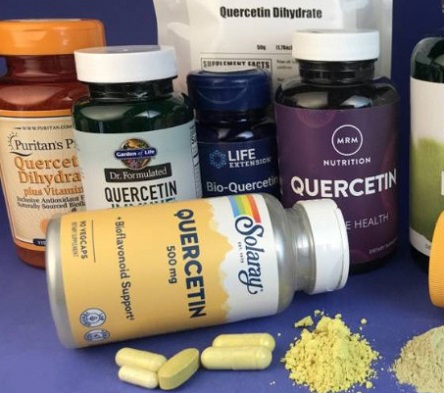Quercetin Is Able to Reduce Expression Of ACE2 And TMPRSS2 But Does Not Prevent SARS-CoV-2 From Entering Lung Cells!
Nikhil Prasad Fact checked by:Thailand Medical News Team Jun 22, 2024 1 year, 6 months, 6 days, 18 hours, 7 minutes ago
COVID-19 News: Quercetin is a flavonoid found in many fruits, vegetables, and grains. Known for its antioxidant and anti-inflammatory properties, it has been the focus of numerous studies exploring its potential health benefits. Recently, researchers have turned their attention to quercetin's potential in combating COVID-19, the disease caused by the SARS-CoV-2 virus. However, a recent Australian study that is covered in this
COVID-19 News report shows that Quercetin efficacy in preventing or treating COVID-19 are limited.
 Quercetin Is Able to Reduce Expression Of ACE2 And TMPRSS2 But Does
Quercetin Is Able to Reduce Expression Of ACE2 And TMPRSS2 But Does
Not Prevent SARS-CoV-2 From Entering Lung Cells!
Understanding COVID-19 and Its Challenges
COVID-19 has presented an unprecedented global health crisis, causing millions of infections and significant mortality worldwide. While vaccines have been developed and distributed widely, the emergence of new viral variants and the persistent problem of long COVID - a condition where symptoms linger for months after the initial infection - highlight the ongoing need for effective treatments and preventive measures.
The Role of ACE2 and TMPRSS2 in COVID-19
To understand quercetin’s potential role, it is essential to know how SARS-CoV-2 infects human cells. The virus uses its spike protein to bind to the angiotensin-converting enzyme 2 (ACE2) receptor on the surface of human cells. This interaction is the first step in viral entry. Another protein, transmembrane protease serine 2 (TMPRSS2), then activates the spike protein, facilitating the virus's entry into the cell. Thus, both ACE2 and TMPRSS2 are critical for the virus to infect human cells.
The Study: A Detailed Approach
A team of researchers led by Dr Michael James Houghton from Monash University-Australia sought to investigate whether quercetin could impact the expression of ACE2 and TMPRSS2 in human lung cells, potentially hindering the virus's ability to infect these cells.
Methodology
The researchers used cultured human lung cells, including immortalized Calu-3 lung cells and primary bronchial epithelial cells (PBECs), to examine the effects of quercetin. These cells were treated with various concentrations of quercetin, and the levels of ACE2 and TMPRSS2 were measured over time using advanced molecular techniques.
The study team also evaluated whether quercetin could directly prevent SARS-CoV-2 infection in these cells by exposing them to the virus after quercetin treatment.
Findings: Promising Yet Complex
The study yielded some intriguing results:
-Reduction in Protein Expression
Quercetin significantly reduced the levels of ACE2 and TMPRSS2 in the treated lung cells. This reduction was dose-dependent, meaning higher concentrations of quercetin led to greater decreases i
n these proteins. The most notable effects were observed after a few hours of treatment.
-No Impact on Virus Infection
Despite the reduction in ACE2 and TMPRSS2 levels, quercetin did not prevent SARS-CoV-2 from infecting the lung cells. This finding suggests that merely decreasing the expression of these proteins is not enough to stop the virus.
Implications for COVID-19 Treatment
The results highlight a crucial point in drug development and disease treatment: reducing the levels of proteins necessary for viral entry does not automatically translate to effective prevention or treatment of the infection. The process of viral infection and replication is complex and influenced by numerous factors.
Potential Combination Therapy
Although quercetin alone did not prevent infection, its ability to lower ACE2 and TMPRSS2 levels suggests it could be useful in combination with other treatments. For instance, combining quercetin with antiviral drugs that target different stages of the virus’s life cycle could enhance overall effectiveness.
The Future of Quercetin Research
The study opens several avenues for future research:
-Exploring Combinations
Researchers could explore how quercetin works in conjunction with other antiviral compounds. This combination approach could potentially enhance the antiviral effects and lead to more effective treatments.
-In Vivo Studies
Most current research, including this study, is conducted in vitro (in cultured cells). To fully understand quercetin's potential, studies in vivo (in live organisms) are necessary. These studies would provide insights into how quercetin behaves in the human body, its bioavailability, and its overall impact on viral infections.
-Long-Term Effects
Investigating the long-term effects of quercetin treatment on ACE2 and TMPRSS2 expression and overall cellular health could provide valuable information. Understanding these dynamics is crucial for developing safe and effective treatment protocols.
Conclusion
Quercetin’s journey from a dietary flavonoid to a potential COVID-19 treatment highlights the complexities of drug development. While it shows promise in reducing the expression of critical proteins necessary for SARS-CoV-2 entry into cells, its inability to prevent virus infection on its own underscores the need for comprehensive approaches in developing effective treatments.
The ongoing research will continue to unravel the potential of quercetin and similar compounds in the fight against viral diseases. Quercetin’s role might be more supportive, acting in synergy with other treatments, rather than a standalone solution. As science progresses, each discovery adds a piece to the puzzle, bringing us closer to effective management and prevention strategies for COVID-19 and other infectious diseases.
In summary, quercetin, a compound found in everyday foods, shows promise in altering key proteins used by SARS-CoV-2 to infect cells. However, its ability to prevent the virus from infecting cells remains unproven, pointing to the need for further research and combined therapeutic strategies.
The study findings were published in the peer reviewed journal: Biofactors.
https://iubmb.onlinelibrary.wiley.com/doi/10.1002/biof.2084
For the latest
COVID-19 News, keep on logging to Thailand Medical News.
Read Also:
https://www.thailandmedical.news/news/covid-19-news-canadian-study-shows-that-quercetin-not-ony-inhibits-sars-cov-2-but-it-also-prevents-syncytium-formation
https://www.thailandmedical.news/news/covid-19-news-mexican-scientists-recommend-quercetin-for-oxidative-stress-issues-in-long-covid
https://www.thailandmedical.news/news/covid-19-news-insights-into-the-mechanism-behind-covid-19-induced-acute-kidney-injury-and-the-potential-therapeutic-role-of-quercetin
https://www.thailandmedical.news/news/quercetin-emerging-as-one-of-the-must-take-covid-19-supplements-especially-when-considering-the-omicron-variant-and-long-covid-19-issues
https://www.thailandmedical.news/news/covid-19-supplements-numerous-studies-show-that-the-phytochemical-quercetin-not-only-inhibits-sars-cov-2-but-helps-in-other-aspects-of-covid-19
https://www.thailandmedical.news/news/breaking-supplements-for-covid-19-quercetin-emerging-as-an-adjuvant-for-covid-19-treatments
